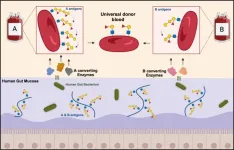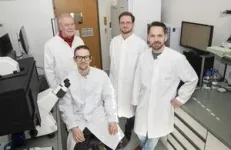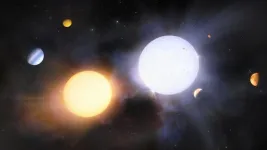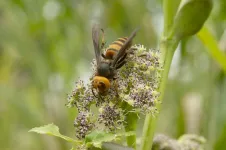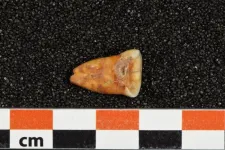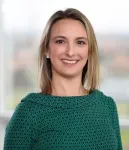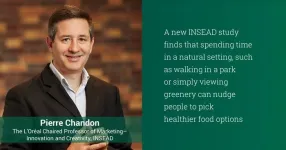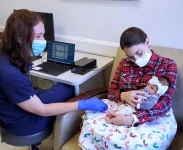(Press-News.org)
The quest to develop universal donor blood has taken a decisive step forward. Researchers at DTU and Lund University have discovered enzymes that, when mixed with red blood cells, are able to remove specific sugars that make up the A and B antigens in the human ABO blood groups. The results have been published in the scientific journal Nature Microbiology.
"For the first time, the new enzyme cocktails not only remove the well-described A and B antigens, but also extended variants previously not recognized as problematic for transfusion safety. We are close to being able to produce universal blood from group B donors, while there is still work to be done to convert the more complex group A blood. Our focus is now to investigate in detail if there are additional obstacles and how we can improve our enzymes to reach the ultimate goal of universal blood production," says Professor Maher Abou Hachem, who is the study leader at DTU and one of the senior scientists behind the discovery.
He states that the discovery is the result of combining the expertise of DTU researchers in enzymes from the human gut microbiota and Lund University researchers in carbohydrate-based blood groups and transfusion medicine.
High demand for donor blood
Human red blood cells carry specific complex sugars structures (antigens) that define the four ABO blood groups A, B, AB and O. These antigens control compatibility between donors and recipients for safe blood transfusion and organ transplantation. Donor blood is screened for disease markers and the main blood groups. It can then be stored refrigerated for up to 42 days.
The need for donor blood is high due to the elderly making up a larger proportion of the population and more patients undergoing blood-intensive medical procedures. Successfully converting A or B blood types into ABO universal donor blood can markedly reduce the logistics and costs currently associated with storing four different blood types. In addition, the development of universal donor blood will lead to an increased supply of donor blood by reducing the waste of blood approaching its expiry date.
The reason why it is necessary to remove the A and B antigens to create universal donor blood is because they can trigger life-threatening immune reactions when transfused into non-matched recipients.
The concept of using enzymes to generate universal donor blood was introduced more than 40 years ago. Since then, higher efficiency enzymes to remove the A and B antigens were discovered, but researchers are still not able to explain or abolish all immune reactions related to the blood, and therefore these enzymes are still not used in clinical practice.
Enzymes from the gut
The research groups from DTU and Lund University have gone new ways to find enzymes that can remove both the A and B blood antigens and the sugars that block them. The research teams discovered new mixtures of enzymes from the human gut bacterium Akkermansia muciniphila that feeds by breaking down the mucus, which covers the surface of the gut. It turns out that these enzymes are exceptionally efficient, as the complex sugars at the surface of the intestinal mucosa share chemical resemblance with those found at the surface of blood cells.
"What is special about the mucosa is that bacteria, which are able to live on this material, often have tailor-made enzymes to break down mucosal sugar structures, which include blood group ABO antigens. This hypothesis turned out to be correct," says Maher Abou Hachem.
The researchers in this study tested 24 enzymes, which they used to process hundreds of blood samples.
"Universal blood will create a more efficient utilization of donor blood, and also avoid giving ABO-mismatched transfusions by mistake, which can otherwise lead to potentially fatal consequences in the recipient. When we can create ABO-universal donor blood, we will simplify the logistics of transporting and administering safe blood products, while at the same time minimizing blood waste" says Professor Martin L. Olsson, the leader of the study at Lund University.
The researchers from DTU and Lund University have applied for a patent on the new enzymes and the method for enzyme treatment and expect to make further progress on this in their new joint project over the next three and a half years. If successful, the concept needs to be tested in controlled patient trials before this can be considered for commercial production and clinical use.
The initial research project is funded by the Independent Research Fund Denmark (Technology and Production Sciences, FTP), the Swedish Research Council, ALF grants from the Swedish government and county councils as well as the Knut and Alice Wallenberg Foundation and Research Fund Denmark, Natural Sciences, FNU), while the new continued project is funded by the Novo Nordisk Foundation, Interdisciplinary Synergy Programme.
FACTS:
Donorblood
In Scandinavia, the four main blood types are distributed with approximately 40-45 percent blood type A, the majority of whom are so-called RhD positive and 10-15 percent RhD negative, followed by blood type O with about 40 percent, B with about 10 percent and AB with about 5 percent. Red blood cells from blood group O are the only type that can be used by all receiving patients regardless of ABO type.
Bacterium from the gut
Akkermansia muciniphila is a bacterium found abundantly in the guts of most healthy humans. This bacterium can break down mucus in the gut and produces beneficial compounds such as the short-chain fatty acid propionate, in addition to exerting beneficial effects on body weight and metabolic markers.
END
It is estimated that up to 85% of stars exist in binary star systems, some even in systems with three or more stars. These stellar pairs are born together out of the same molecular cloud from a shared abundance of chemical building blocks, so astronomers would expect to find that they have nearly identical compositions and planetary systems. However, for many binaries that isn’t the case. While some proposed explanations attribute these dissimilarities to events occurring after the stars evolved, a team of astronomers have confirmed for the first time that they can actually originate ...
Researcher Ko Mochizuki of the University of Tokyo discovered that two species in the genus Angelica are pollinated primarily by hornets. This overturns the conventional belief that Angelica species are “generalists,” meaning that there is not one primary pollinator but a variety of species. As hornets are rarely primary pollinators, the discovery also impacts future ecological research and conservation efforts. The findings were published in the journal Ecology.
White, small, open, secretes nectar and produces pollen: these are the kinds of flowers that many types of insects can reach ...
About The Study: In this randomized, placebo-controlled clinical trial that included 3,020 patients with high-risk nonmetastatic breast cancer, daily aspirin therapy did not improve risk of breast cancer recurrence or survival in early follow-up. Despite its promise and wide availability, aspirin should not be recommended as an adjuvant breast cancer treatment.
Authors: Wendy Y. Chen, M.D., of the Dana Farber Cancer Institute in Boston, is the corresponding author.
To access the embargoed study: Visit our For The Media ...
About The Study: This systematic review and meta-analysis showed that the incidence proportion of new-onset seizures after SARS-CoV-2 vaccination was not statistically different between vaccine recipients and placebo recipients or unvaccinated participants in the pooled analyses of more than 118,000 participants in randomized clinical trials.
Authors: Churl-Su Kwon, M.D., M.P.H., of Columbia University in New York, is the corresponding author.
To access the embargoed study: Visit our For The Media website at this link https://media.jamanetwork.com/
(doi:10.1001/jamaneurol.2024.0967)
Editor’s Note: Please see the article for additional information, including ...
Europe's forests have already been severely affected by climate change. Thousands of hectares of trees have already died due to drought and bark beetles. Scientists from the University of Vienna and the Technical University of Munich TUM have now investigated which trees can be used for reforestation. Their findings: only a few tree species are fit for the future, such as English oak in the UK. However, mixed forests are important for the survival of forests, otherwise the forest ecosystem as a whole could be weakened. The results of the study were recently published in the renowned journal Nature Ecology and Evolution.
Although European forests are naturally home to a ...
Conducted by an international team of scientists from the Max Planck Institute for Evolutionary Anthropology (Leipzig, Germany), Géoscience et Environnement Toulouse (Toulouse, France), and the Institut National des Sciences de l’Archéologie et du Patrimoine (Rabat, Morocco), the study examines the diet of individuals associated with the Iberomaurusian culture discovered in the cave of Taforalt, Morocco. Using a comprehensive multi-isotopic approach, including zinc and strontium isotope analysis in dental enamel, carbon, nitrogen, ...
WASHINGTON – A new study examining the role of aspirin in breast cancer treatment reveals critical issues related to health equity and aging that have broad implications for cancer and other disease intervention trials, say researchers from Georgetown University’s Lombardi Comprehensive Cancer Center. They outline their concerns in an editorial accompanying the study’s findings published April 29 in the JAMA (“The Aspirin Conundrum: Navigating Negative Results, Age, Aging Dynamics and Equity”).
The ...
HOUSTON and ALBUQUERQUE, N.M. ― A national study led by researchers at The University of Texas MD Anderson Cancer Center and The University of New Mexico (UNM) Comprehensive Cancer Center found major gaps in breast, cervical and colorectal cancer screening use in Federally Qualified Health Centers (FQHCs) in the U.S., relative to overall screening rates in the country.
The findings, published today in JAMA Internal Medicine, revealed screening use in FQHCs was 45.4% for breast cancer, 51% for cervical cancer and 40.2% for colorectal cancer, compared to cancer screening rates in the general American population of 78.2%, 82.9% and 72.3%, respectively.
“FQHCs ...
Natural scenery typically conjures up positive emotions and a sense of wellbeing for most individuals. A new study by INSEAD shows that verdant views can also nudge people to pick healthier food.
Published in Communications Psychology, a new journal by Nature, the study suggests that spending time in a natural setting, such as walking in a park (vs. on city streets), or simply viewing greenery outside the window (vs. an urban view), leads people to make healthier food choices afterward.
“Our ...
A modified pacifier and AI algorithms to analyze the data it produces could determine if newborns are learning the proper mechanics of nursing, a recent study shows.
Specifically, the researchers from the University of California San Diego measured if babies are generating enough suckling strength to breastfeed and whether they are suckling in a regular pattern based on eight independent parameters.
The results, published in the April 18 online edition of IEEE Journal of Translational Engineering ...
